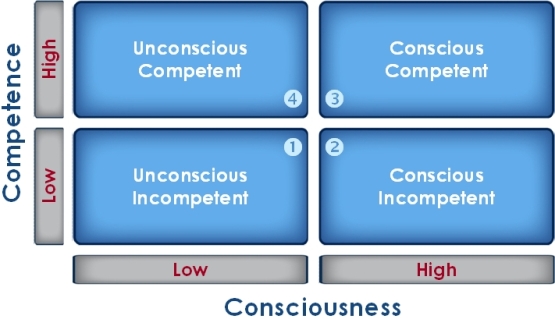In a previous article, I wrote about the parallels between recruiting people and recruiting partners, and how the principles we apply to recruiting staff are equally applicable to recruiting partners. Today, we look at the parallels between developing staff and enabling partners.
Over the years, the “Conscious Competence” Model has become a popular and insightful framework to explain the psychological stages of learning a new skill. It describes how people progress through 4 stages of learning, and how leaders must change their management style with employees in each of the different stages. In this article we describe how newly recruited partners also go through the same 4 stages, and how your channel enablement style needs to change accordingly.
But first let’s look at the model…
The “Conscious Competence” model is a 2×2 matrix that maps Competence (ie. the skills/motivation to do a task) against Consciousness (ie. the awareness of your level of Competence).
This gives us a matrix that looks like this, with four distinctive phases:

Phase 1 – Unconscious Incompetent (“I don’t know what I don’t know”)
This is where most employees land when they commence a new role. The individual does not understand or know how to do something, but may not necessarily recognise that they have a weakness or what to do about it. Often, their confidence may far exceed their abilities. During this phase, the most suitable management style is one that is very prescriptive. The Manager must provide very clear and specific instructions on what and how to do a task, and help the employee become aware of how much they need to learn by demonstrating the skill or ability. They must also “sell” the importance of the skill and the benefit that it will bring to the person’s effectiveness when they master this skill.
Similarly newly recruited partners are blissfully unaware of how to sell your product or what the profit model will look like in reality. Therefore, as a Channel Manager, your channel enablement approach must be more prescriptive (ie. give very clear guidance on how to sell your product, provide clear buyer profiles, explain the customer buying cycle for you product, describe the process your own sales people use to close business, demonstrate the profit model of your product and what services you expect the partner to provide). In addition, your role is to help the partner understand where their gaps are, and where to invest in order for them to become proficient and profitable. This is a selling role designed to excite and motivate the partners into understanding what the future benefits will be if they develop their skills in your technology.
Phase 2 – Conscious Incompetent (“I now know what I don’t know and what I need to know”)
In this phase, the individual becomes aware of the existence and relevance of the skill and becomes aware of their weaknesses. They make a conscious effort to learn the new skill, in order to move to the ‘conscious competent’ stage. This is not a comfortable phase for the employee. The Manager’s role here is to educate and train the employee and to help them develop their skills.
Similarly, this phase is an uncomfortable one for partners. They will start to get a much better understanding of the technology, but also become painfully aware of their own lack of skills. During this phase, they may start to question whether they will ever be able to make money from your product. Consequently, this stage requires the most investment and hand holding (technical training, sales training, joint sales calls, regular meetings, joint technical rollouts, provision of best practices installations, etc). This is a very time-intensive, so your organisation cannot afford to have too many partners in this phase at the same time.
Phase 3 – Conscious Competent (“I know what I know and how to do it well”)
The learner at this point feels a sense of achievement – they can perform the task without assistance, but it does still require thought. In other words, they are still conscious of what they are doing and have to make an effort to do the right things to get the outcome they desire. The ideal management style in this phase is provide plenty of tips, techniques, and tricks to help the learner be more efficient and successful. The manager may discuss options with the employee, but the final decision rests with the employee.
Partners in this phase are becoming capable and can see the results of their efforts. They are keen to engage with vendors, and keen to understand how to be more efficient. In this phase, the most effective channel enablement strategy comes from working as genuine business partners rather than the normal buyer/seller relationship (joint account planning, engagement at all levels within the vendor/partner, account mapping, Deal Registration, joint marketing activities). They are the perfect partners to incorporate into your Partner Advisory Council.
Phase 4 – Unconscious Competent (“I know it so well, I don’t need to think about it”)
By phase 4, the learnt skill has becomes second nature to the individual. They can do it without thinking. The ability to do the skill has become ingrained in the person – it is now second nature. For a manager, these are your best performers – just point them in the right direction, move things out of their way, and let them run. But if they are not managed appropriately they can become arrogant and create problems.
Similarly, partners in this phase can appear to be the perfect partner as they usually are the revenue “heavy hitters”. They’re completely independent and very capable, They know your products, program and processes backwards (in some cases, better than your own people do) and how to work the system to their advantage. At this point they do not require enablement but they do need to be managed. They need to be encouraged to continue to invest around new products, and/or customer opportunities. The biggest risk with these partners is complacency, and the best way to manage these partners is with proactive business planning and joint engagement where you recognise and utilise their capabilities.
The Cycle
Imagine you are a very successful Sales Director of a medium sized business, and you have has just been promoted to CEO as part of the strategy to list the company on the stock exchange. Even though you are a very senior and experienced individual, you are moving into a role where you may not know what you don’t know. You might know everything there is to know about sales, but don’t yet know how much you need to learn about (say) operations. In effect, you have gone from being an Unconscious Competent to an Unconscious Incompetent. And so the cycle starts again.
The same thing happens with partners. When vendors acquire a new (different) technology, they naturally assume that the reseller’s unconscious competence will enable them to succeed with their new product offering. What they don’t realise is that the partner may actually be incompetent in this technology without realising it. And if the vendor doesn’t pick up on this, their enablement approach may be completely misguided. So make sure that when you do release a new technology, that you assess exactly which quadrat your partners are in, and adopt the appropriate channel enablement strategy.
Summary
Good Managers are able to hire and manage a broad range of employees with varying skills and capabilities. Their management style changes depending on the consciousness and competence of their employees. They know they can’t just rely on 1 or 2 top performers to make the number each quarter, but that they have to develop the whole team.
Great Channel Managers are the same. They have a broad partner base at varying levels of capability. They change their channel enablement approach to suit the partners. They don’t just focus on the top performers – they make an effort to help more of their partners progress through the four phases. They recognise that their Tier 2 partners require far more effort than their Tier 1 partners, but that you need to put in that effort to help that partner be successful.
Managing people and managing partners requires effort. But the type of effort varies depending on which phase they’re in. With the right channel enablement strategy, and the right sales training, your partners can be more than just competent – they can be competent and unconscious.
Read Part 2 of the article in “Enablement Vs Certification … Is there a Difference?”


